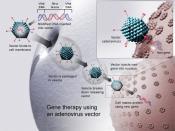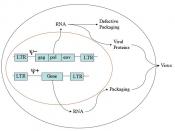Germline Engineering: The Ultimate Gene Therapy � PAGE �4�
Germline Engineering:
The Ultimate Gene Therapy
Rebecca Guan
Victoria Park Collegiate Institute
Germline gene therapy has tapped into the very core of what it means to be human with the ability to govern the very genetic makeup of our offspring; a feat that was only dreamed of 100 years ago. By introducing genetic modifications to the fertilized egg, changes are applied to all subsequent cells making germline engineering, according to Campbell (2003), the ultimate form of gene therapy. Unsurprisingly, there are many moral and ethical implications regarding "designer babies, perfect human beings... a society based on 'playing God'" (Campbell, 2003). Nonetheless, germline engineering provides a hopeful future for mankind. The development is inevitable and humanity has already long meddled in reproductive fates; germline technology does not present itself to be a large stretch.
Despite the religious belief that 'we are all equal in the eyes of God', a secularist may argue frankly that human beings are not equal when we observe differences in physical appeal and natural talent.
From Alexander the Great to Shakespeare to even celebrities today, select humans have been idolled for their attractiveness or markettable talent. "Those who are able-bodied, intelligent, and accomplished... better than... handicapped, feeble-minded, and inept... Little doubt these are disabilities to be wished away." (Graham, 2002, p. 151). Therefore, while we criticize society's tendency to intimidate, bully, and discriminate one another, germline gene therapy provides a solution to undesirable physical variances and allows our children to experience true equality.
The Principle of Procreative Beneficence suggests that if couples decide to have a child, they have a moral reason to select for a life that can be expected to fare the best (Savulescu, 2009, p. 274). This principle thus requires that parents have...


